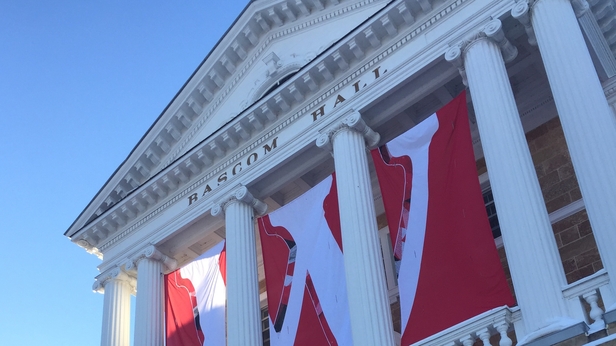
June 23, 2017
By Jessica Murphy
In the case Matal v. Tam, an Asian-American dance-rock band was denied trademark rights to their band name “The Slants” because it was deemed a racial slur. On Monday, the Supreme Court stood up for free speech, striking down the law that allowed “disparaging” trademarks to be blocked by the Patent and Trademark Office. The unanimous 8-0 vote shows that free speech is indeed a nonpartisan issue – something Wisconsin Democrats would do well to learn.
On Wednesday, Rep. Jesse Kremer’s (R-Kewaskum) campus free speech bill passed the Assembly on a 61-36 vote after almost five hours of heated debate. Democrats fought tooth and nail to kill the bill, calling it unconstitutional, a “gag order,” and even anti-free speech.
Some Democrats expressed concerns that the free speech bill would favor conservatives and silence protests against conservative campus speakers. Perhaps more worrisome is the fact that many  Democrat legislators argued that free speech is not an issue on UW campuses, apparently tuning out many of the student testimonies delivered at the May 11th public hearing in front of the Assembly Committee on Colleges and Universities.
Democrat legislators argued that free speech is not an issue on UW campuses, apparently tuning out many of the student testimonies delivered at the May 11th public hearing in front of the Assembly Committee on Colleges and Universities.
Students at UW-Oshkosh encouraged people to write on a giant beach ball they were rolling around on campus last fall. This was an effort to promote free speech and raise awareness about campus policies that violate the first amendment. Campus police stopped and questioned the students after receiving complaints of offensive messages on the ball. Officers also took one of the student’s IDs to search for existing warrants.
Since when has exercising the first amendment been a crime?
A UW-Green Bay student recalled an incident from December 2015 when students raising awareness about sexual assault were forcibly removed from the University Union to the “free speech zone” – a small area restricted for speech. The free speech zone at UW-Green Bay is out near the main entrance of the Union, by the bell tower on a small hill, surrounded by bushes, and fenced off from the main walking paths. Lack of access is a concern, but more importantly, that students had no other option than to go outside in the middle of a Wisconsin winter to express themselves reveals a sad state of affairs on our campuses.
Free speech zones do not preserve free speech, but rather limit the reach and stifle the voices of students who wish to hold demonstrations. The constitutionality of speech zones is questionable at best. Many universities and states have passed rules or legislation to ban them, yet UW-Green Bay, UW-Parkside, and UW-Oshkosh have these zones.
The intolerance for different viewpoints is pervasive on college campuses as well, with invited speakers being shouted down, physically assaulted, or banned from speaking. However, there’s a difference between voicing a dissenting opinion and restricting another’s first amendment rights.
This is highlighted by the protest at Ben Shapiro’s speech at UW-Madison in November where protesters jumped on stage and disrupted the event with chants for almost 20 minutes before being escorted out of the room.
Conservative talk show host Vicki McKenna followed the protesters to the lobby and as she was filming, protesters surrounded her, aggressively got in her face, called her a white supremacist, and attempted to knock her phone out of her hand. One even had the audacity to comment that they had to interrupt Shapiro’s speech because “the presence of this event on this campus is violent,” which is ironic considering they were the only ones at the event acting violently.
Some think the UW administration did not reprimand the disruptive student protesters harshly enough. It is clear that these students are in need of a lesson in Free Speech 101. They are evidently unaware that Wisconsin is a one-party consent state, which means that people can film you without your permission. They also have the mindset that throwing a temper tantrum is the most effective means to relay their message.
Their chants of “shame” and “safety” accomplished nothing except making themselves look obnoxious and disrespectful to the students who spent months planning the event. If they have valuable ideas or wish to share dissenting opinions, they should engage with speakers during Q&A or create their own platform.
Is contentious speech protected by the first amendment? Yes. Is protesting protected by the first amendment? Of course. Is attempting to shut down a private event by violating someone else’s speech rights protected by the first amendment? No.
Rep. Dave Murphy (R-Greenville) referenced the famous Louis Brandeis quote – “sunlight is the best disinfectant” – in his floor speech to highlight that silencing and disrupting speech you do not agree with does not accomplish anything.
Silencing certain speech, even those deemed as hate speech, will not stop those thoughts from existing. Allowing these ideas to be debated is the only way to effect change. Rather than shielding oneself from differing views, people should embrace them as an opportunity to solidify or tweak their own viewpoints.
In his floor speech, Speaker Robin Vos (R-Rochester) summarized attacks on free speech that have happened recently across the nation as well as some of these cases that happened on UW campuses. He went on to encourage his fellow legislators to drop their personal rhetoric because “freedom of speech should know no political divide.”
The Supreme Court decision reiterates an idea that many people, especially some college leftists, seem to have forgotten – you have a right to free speech, but you don’t have the right to not have your feelings hurt. Kudos to the Assembly for following suit and upholding UW students’ first amendment rights.